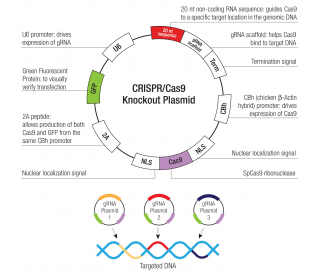Purity
>95%, by SDS-PAGE with silver staining.
Endotoxin Level
<0.10 EU per 1 μg of the protein by the LAL method.
Activity
Measured by its ability to induce cAMP accumulation in HEK293 human embryonic kidney cells transfected with human TSH R. Morgenthaler, N.G. et al. (1998) Horm. Metab. Res. 30:162. The ED 50 for this effect is 0.015-0.15 ng/mL.
Source
Chinese Hamster Ovary cell line, CHO-derived
Mouse TSH beta
(Phe21-Val138)
Accession # P12656(GGGS)3 Mouse TSH alpha
(Leu25-Ser120)
Accession # P01216N-terminus C-terminus N-terminal Sequence
AnalysisPhe21 (mTSH beta )
Predicted Molecular Mass
25 kDa
SDS-PAGE
35-41 kDa, reducing conditions
Carrier Free
What does CF mean?
CF stands for Carrier Free (CF). We typically add Bovine Serum Albumin (BSA) as a carrier protein to our recombinant proteins. Adding a carrier protein enhances protein stability, increases shelf-life, and allows the recombinant protein to be stored at a more dilute concentration. The carrier free version does not contain BSA.
What formulation is right for me?
In general, we advise purchasing the recombinant protein with BSA for use in cell or tissue culture, or as an ELISA standard. In contrast, the carrier free protein is recommended for applications, in which the presence of BSA could interfere.
8885-TH/CF |
| 8885-TH |
Formulation Lyophilized from a 0.2 μm filtered solution in PBS. | Formulation Lyophilized from a 0.2 μm filtered solution in PBS with BSA as a carrier protein. | |
Reconstitution Reconstitute at 100 μg/mL in PBS. | Reconstitution Reconstitute at 100 μg/mL in PBS. | |
Shipping The product is shipped at ambient temperature. Upon receipt, store it immediately at the temperature recommended below. | Shipping The product is shipped at ambient temperature. Upon receipt, store it immediately at the temperature recommended below. | |
Stability & Storage: Use a manual defrost freezer and avoid repeated freeze-thaw cycles.
| Stability & Storage: Use a manual defrost freezer and avoid repeated freeze-thaw cycles.
|
Background: TSH alpha/beta Heterodimer
Thyroid Stimulating Hormone (TSH), also known as Thyrotropin, is a 28 kDa heterodimer belonging to the glycoprotein hormone family. It is composed of noncovalently linked glycosylated alpha and beta chains. The alpha subunit (CG alpha ) is also a component of Follicle-Stimulating Hormone, Luteinizing Hormone, and Chorionic Gonadotropin. The unique beta subunit confers the protein’s specific biological action and is responsible for the interaction with its receptor (1-3). The approximately 14 kDa mouse CG alpha subunit shares 73% and 97% amino acid (aa) sequence identity with the human and rat orthologs, respectively. The approximately 15 kDa mouse TSH beta subunit shares 89% and 92% aa sequence identity with the human and rat orthologs, respectively. Multiple isoforms of TSH with differing bioactivity and
half-lives exist due to differences in the post-translational glycosylation and sialylation modifications of its subunits (1, 4). TSH is produced and secreted by the anterior pituitary gland. Its secretion is controlled by Thyrotropin-Releasing Hormone (TRH) from the hypothalamus. TSH travels to the thyroid gland and binds to the TSH Receptor to stimulate production of Thyroxine (T4), which is converted in peripheral tissues to Triiodothyronine (T3), a more biologically potent form of the thyroid hormone (1, 4, 5). TSH secretion is also controlled by plasma T3 and T4 via a negative feedback mechanism and by the neurotransmitters dopamine and Somatostatin (4, 5). Serum TSH levels are often assessed to evaluate thyroid function (4, 5). TSH has also been shown to be produced by bone marrow and is believed to have a direct effect on skeletal homeostasis by promoting bone strength and quality (6-9). Additionally, serum TSH levels have been shown to be decreased in the elderly (10).
References:
Szkudlinshi, M.W. et al. (2002) Physiol. Rev. 82:473.
Farid, N.R. and M.W. Szkudlinski (2004) Endocrinology 145:4048.
Cahoreau, C. et al. (2015) Front. Endocrinol. (Lausanne) 6:26.
Roelfsema, F. and J.D. Veldhuis (2013) Endocr. Rev. 34:619.
Winter, W.E. and M.R. Signorino (2001) Ann. Clin. Lab. Sci. 31:221.
Klein, J.R. and H.C. Wang (2004) J. Exp. Biol. 207:55.
Abe, E. et al. (2003) Cell 115:151.
Sun, L. et al. (2006) Ann. N.Y. Acad. Sci. 1068:309.
Sendak, R.A. et al. (2007) Int. Orthop. 31:753.
Peeters, R.P. (2008) Hormones 7:28.
Long Name:
Thyroid Stimulating Hormone
Alternate Names:
Thyrotropin; TSH alpha/beta Heterodimer










